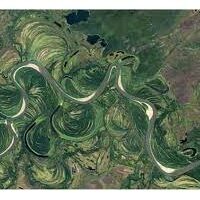Despite creating one of Earth’s most iconic landforms, and having been studied since antiquity, river meandering is currently explained by several alternative models that remain debated. This is partly because observers have deconstructed meanders to a set of properties thought to be fundamental or significant for meandering, but each of these underpinning properties is itself complex and in turn requires analysis of its causes and mechanisms. This philosophical contribution aims to provide a perspective on the state of the science that makes a rigorous interrogation into what ‘causation’ actually means, and explores what a systems perspective can elucidate about meandering phenomena. We approach the problem through a discussion of the variety of ways in which previous researchers have tackled the problem of meandering, from a channel and floodplain perspective, on Earth and Mars, in the field and laboratory, and at the present day through to the ancient stratigraphic record. It is evident that river meandering has numerous causal pathways rather than a single set of necessary and sufficient conditions. A systemic view on the evolution of plant species shows that their feedbacks on river pattern likewise have several pathways. Employing the conceptual apparatus of the philosophy of science will move us towards a more consensual synthesis of river meandering.
What even is a meandering river?
A philosophy-enhanced synthesis of multilevel causes and systemic interactions contributing to river meandering


